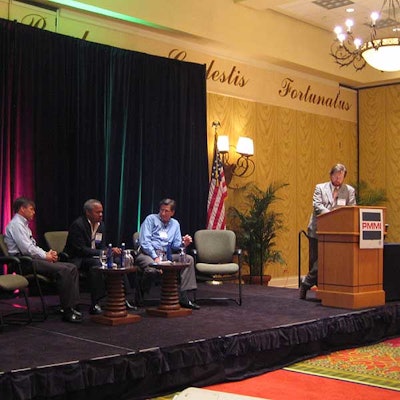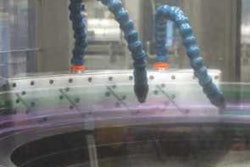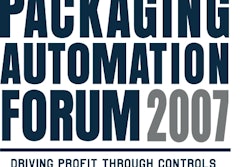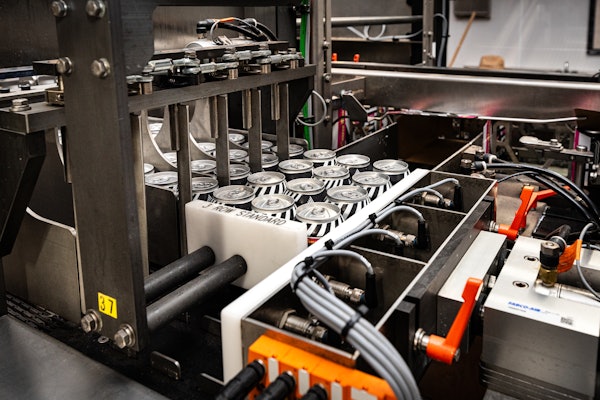
MarketTrends panelists (left to right) Jay Gehring, VP R&D Packaging for Frito Lay; Ivor Barrett, Manager, Packaging Technology
PMMI MarketTrends saw over 100 attendees, primarily PMMI members, come to learn the rapidly evolving trends influencing packaging machinery design and business practices. A panel of users was one of the early highlights, delivering plain-spoken advice on doing business with global companies.
Panelists were Ivor Barrett, Manager, Packaging Technology for Miller Brewing; Bob Collins, Director of Global Package Development for P&G Gillette; and Jay Gehring, VP R&D Packaging for Frito Lay.
Packaging OEMs must go global
The bottom line is that more and more is being expected of machinery builders – make that solution providers – as the competition for packaging system sales has become truly global.
Specifically, Collins noted that Gillette operates in 7 countries, and only one of their manufacturing facilities is in the U.S. They’ve found that some German suppliers are big enough to do a front end solution, and while most Italian companies are not, they are adept at working together with a lead OEM to provide a unified solution. His advice to North American builders: instead of incremental pieces of equipment, provide a turnkey solution, especially for global companies that do most of their manufacturing overseas.
Global footprint is a foot in the door
Gehring echoed this sentiment, saying that US suppliers should sell solutions to compete globally, not equipment. They must understand their customer’s business to get a foot in the door, especially internationally.
Since South African Breweries’ (SAB) acquisition of Miller, the same globalization strategy has been true there. Barrett said that suppliers need to have a more global presence than before. And OEMs need to be proactive offering new solutions as right-sizing, retirements and SAB’s focus on their core business have reduced internal engineering resources.
Cultural challenges
Global operations pose a range of challenges that automated machinery can help solve, but not without some dilemmas. In developing countries, economics may dictate machinery costing orders of magnitude less than those used in Western markets to run the same package. And while labor costs may appear to be much lower, in cultures such as former Communist countries the work ethic can pose big challenges.
Global yet grassroots: innovations decentralized
Local Miller facilities are doing more prototyping, vendors are calling directly on facilities, and ideas are ‘bubbling up’ to corporate. Global portals are set up for best practices coming up from various business units or ‘hubs.’
Time to market: high expectations
Miller is working with major OEMs to reduce cycle time and therefore Miller's time to market. Modularizing is one thing they're working on, and Barrett noted that faster delivery can be an advantage for a smaller vendor. Gehring expects 4 month lead times for standard equipment and up to 30 months for specialty machinery.
Machinery has everything to do with solving sustainability
Sustainability is an issue for Collins that requires front end research into materials, such as PLA derived flexibles, that might not run on Gillette’s existing machines or tooling. Retooling costs can be significant, so clearly machinery providers would be well advised to keep their R&D apace of material developments.
Innovation can be ‘frustrating’
Gehring described the kind of company Frito Lay wants to partner with on the front end: one that has a better idea than the one for which they are soliciting bids. Innovation is the key, on a continuous basis, year after year, on 2 to 3 tiers. “You need to be looking for the ‘ah-ha,’ changing the game with long term developments,” said Gehring. By that, he explained, he means 3 to 5 years out, which can be frustrating because “we don’t even know.”
He said that as Corporate America downsizes its technical ranks and talent is lost though retirements, vendors are being called upon to develop innovation. And it’s not just for growth. He expressed the tremendous pressure to create cost innovation, to deliver productivity gains. With most new consumer products lasting only 3 to 4 years, it’s no longer feasible to wait for products to mature before working on margins.
What isn’t as clear is how machinery suppliers will get the resources to sustain the innovations these packagers are seeking. Which means that OEMs will need to find innovation partners of their own to enable their breakthrough machine designs.
Where can OEMs find innovation partners of their own?
Not from their status quo control suppliers, it’s clear. The new class of automation technology provider is one focused on the industry’s global issues, with a track record of constant innovation and purpose-built packaging solutions, and operating not as a hardware or software vendor but as a packaging community insider.
This has proved the winning solution in other industries, such as metalworking and semiconductor, where breakthrough technologies and standards resulted from a laser focus on those industries’ unprecedented initiatives for improved yields, repeatable precision, net materials and technology transfer.
Analysts identify innovation partner for packaging
This has been the successful business model for ELAU in packaging automation, as reported in a number of ARC analyst reports.
As recently as last summer, it’s become clear that CPG manufacturers are opening their control specifications to wean themselves from status quo suppliers and admit solutions such as ELAU’s. This is a necessary step toward innovation, which is the antithesis of ‘status quo.’
It’s also clear that modularity, the flexibility of embedded robotics, and even mechatronic packaging machine designs, were all pioneered by ELAU.
The latest innovation reported by ARC? A new level of modularity for world-class machinery with Intelligent Servo Modules, one that is recognized as game changing in terms of rapid changeover. Unprecedented reconfigurability and maintainability.
Companies in this article

























